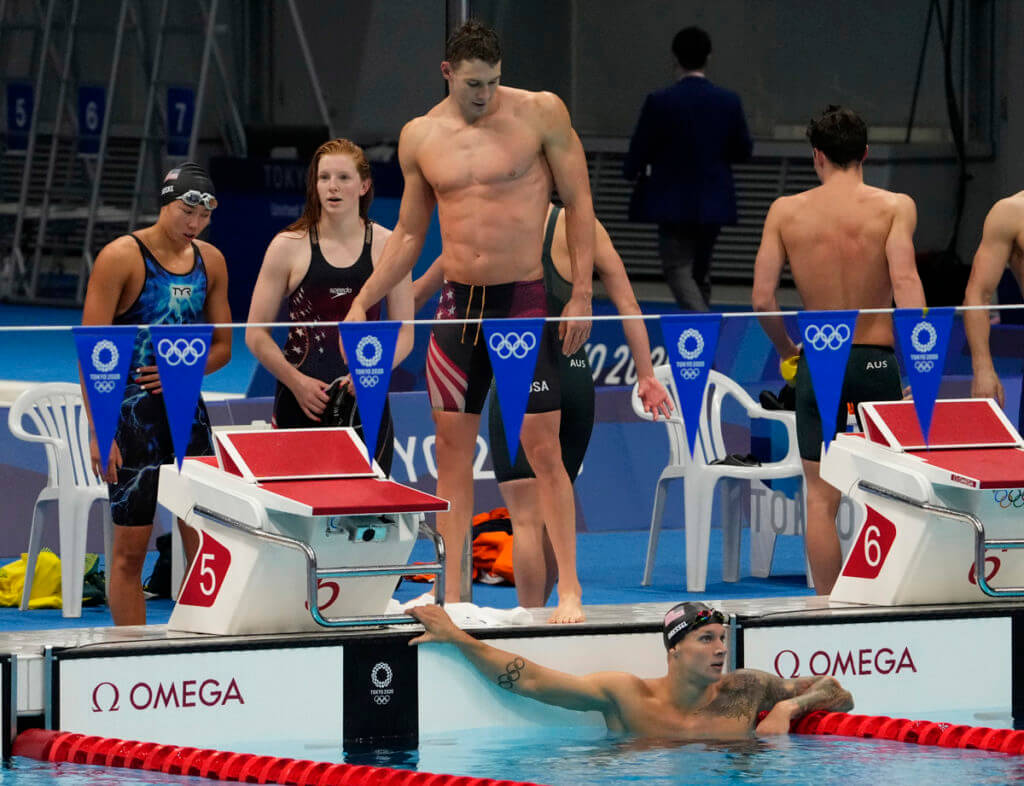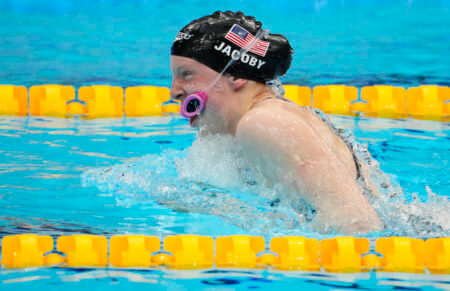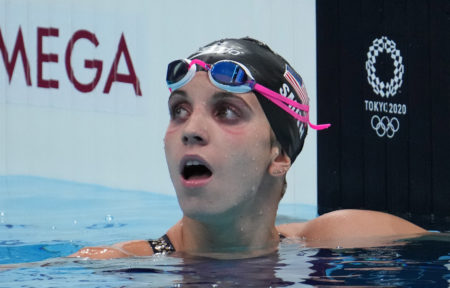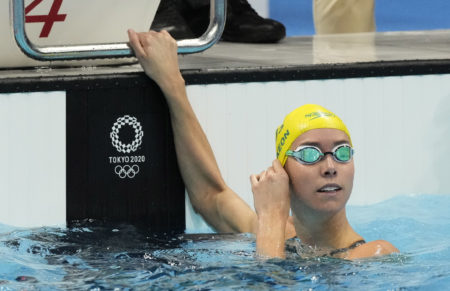Olympics: After Mixed Medley Fiasco, Americans Need Relay Redemption in Finale

Editorial content for the 2021 Tokyo Olympic Games coverage is sponsored by GMX7.
See full event coverage. Follow GMX7 on Instagram at @GMX7training #gmx7

Olympics: After Mixed Medley Fiasco, Americans Need Relay Redemption in Finale
The four-person swimming relay debuted at the fourth edition of the modern Olympics, at the 1908 Games in London. Men competed in the 800 freestyle relay in 1908, while the first women’s relay came with the addition of the 400 freestyle relay four years later at the 1912 Games in Stockholm. The Americans did not enter a team in that initial women’s relay, and 68 years later, there would be no American relays at the boycotted 1980 Olympics in Moscow.
But aside from those absences from the field altogether, no American swimming relay had ever missed the podium. None. Zero. From 1908 until 2016, the Americans were podium perfect.
Now, in one Olympics, two relays have come up short. First was the men’s 800 free relay Wednesday, when Zach Apple faded over the last 50 meters of his split. The Americans finished fourth, six tenths away from the podium, an especially painful outcome considering that simply replacing Apple’s split with Andrew Seliskar’s from prelims would have earned the Americans a silver medal.
That was bad. What happened in the mixed medley relay was much worse.

Lydia Jacoby’s goggles fell off when she dove in to swim breaststroke on the mixed medley relay, but she still managed an admirable effort — Photo Courtesy: Rob Schumacher/USA Today Sports
The Americans got a good leadoff split from Ryan Murphy, but anyone cheering for the U.S. likely got worried when they saw Lydia Jacoby eating her goggles. They had fallen off her eyes on the start, and there was nothing Jacoby could do. And you know what? Her split was 1:05.09, just 0.14 off her gold-medal winning time from earlier in the week. Props to the 17-year-old for keeping her composure there. After a goggles malfunction, that’s a great swim. The near-disaster had no impact on the race’s outcome.
“Yeah, I don’t know. I’ve never really had that happen before. It’s out of my control at that point once I’m in the water, so I just swam the best I could as it’s happening in the moment,” Jacoby said. “I was definitely panicking a little. I could still breathe. I think my turn was where it was most rough because I couldn’t see the wall, but other than that, I feel like I pulled through as best I could.”
Then Torri Huske went in, and she went out in 25.41 before fading slightly down the stretch. Her final split was 56.27, a half-second slower than her 55.72 from the individual 100 butterfly final. Sure, she probably faded down the stretch, but with the Americans eight seconds out of first place and five seconds out of sixth, Huske got hit with a huge wall of water as the Australian and British anchors dove in on either side of her right as Huske went by.
Caeleb Dressel was left with an enormous deficit to overcome, and he split 46.99, not bad for his third race of the evening, but that still left the Americans with a final time of 3:40.58, three seconds off Great Britain’s gold-medal winning time of 3:37.58 and more than a second and a half away from the medals.
Frankly, all of the U.S. swimmers performed fairly well. So how did this relay end up fifth?
The Critical Lineup Errors
Imagine, for a moment, another scenario. Regan Smith led off the prelims squad for the mixed medley relay in 57.64. Michael Andrew has not been great in Tokyo, and he swam the 50 free final earlier in the night, but Andrew Wilson has split as quick as 58.35 on a medley relay before, and Nic Fink has been 58.57. Dressel broke the 100 butterfly world record earlier in the session, touching in 49.45, and Abbey Weitzeil swam a 52.99 in the 100 freestyle semifinals.
57.64 + 58.57 + 49.45 + 52.99 = 3:38.65
Boom. There’s a medal. Great Britain was still a full second faster, but just like in the men’s 800 free relay, they were probably untouchable here, the dynamics of the mixed medley relay allowing them to minimize their weaknesses (like men’s backstroke, which will be the Brits’ Achilles heel in the upcoming men’s medley relay). But 3:38.65 is two tenths quicker than China’s silver-medal winning time of 3:38.86.
Sure, Dressel would still have to pull the double in this scenario, and Weitzeil had just competed in the 50 free semifinals, but Australia’s Emma McKeon went directly from swimming an Olympic record of 24.00 in the second semifinal back to the ready room for the relay, with no time for a single lap of warmdown, and she still anchored for Australia in 51.73. If the American coaches were uncomfortable with that double for Weitzeil, Erika Brown swam a 52.86 anchor leg in prelims of the women’s medley relay the night before. The Americans had options.

The numbers suggest that the U.S. mixed medley relay squad should have included Regan Smith — Photo Courtesy: Robert Hanashiro/USA Today Sports
But U.S. coaches Greg Meehan and Dave Durden, along with national team director Lindsay Mintenko, decided upon Murphy, Jacoby, Huske and Dressel. We don’t know why they chose that option. But an analysis of the Americans’ best times from the Olympics showed that they should deploy female swimmers on backstroke and freestyle and male swimmers on breaststroke and butterfly. Compare the differentials of each swimmer’s best. This uses Dressel’s semifinal effort for the 100 fly, since relay lineups were due before the individual 100 fly final.
Backstroke: Murphy 52.20 vs. Smith 57.64 = 5.44
Breaststroke: Andrew 58.62 vs. Jacoby 1:04.95 = 6.33
Butterfly: Dressel 49.71 vs. Huske 55.73 = 6.02
Freestyle: Dressel 47.02 vs. Weitzeil 52.99 = 5.97
So using Smith on the backstroke leg here should have been a no-brainer. That’s the first mistake. If the coaches did not want Andrew to swim the double, they had other options for a male breaststroker that would suffice here.
Beyond that, Dressel on the butterfly makes more sense than on the freestyle to keep the Americans in range and not give Dressel such an enormous deficit to make up as he did when Huske swam fly. Imagine the first two legs proceeded exactly as they did and then Dressel swam fly. Simply matching his 100 fly flat-start world record from earlier in the night (with the benefit of a relay exchange), the Americans would have been fourth after his leg, just a shade off second place. Weitzeil would have at least had a fighting chance on the anchor leg, which Dressel did not have fighting from way behind.
Murphy explained the coaches’ reasoning for making that choice. “I think that’s just a matter of circumstances. Our two fastest 50 freestyler were in the heat before, so that turnaround is really quick. I think that’s what really led to the decision to put Caeleb in the freestyle.”
So What’s Next?
It is day seven of the Olympics, and the Americans have one gold and just three medals in five relays so far. The last time the Americans won less than three gold medals in relays at an Olympics was in 1956 – when there were only two relays on the program, and Australia won both. Barring a sweep of the women’s and men’s medley relays in Sunday’s swimming finale, that streak will come to an end.
That said, the Americans should be co-favorites to win gold in both events. Admittedly, that news might be another gut punch to U.S. fans who just watched the mixed medley relay finish fifth, but we have already hashed that one out enough.
For the American women, the team is likely to be Smith, Jacoby, Huske and Weitzeil, in that order. The only slight question mark is Weitzeil, who will have to pull a double with the 50 freestyle final, but the schedule calls for 35 minutes in between races. And the primary competition for the U.S. will be Australia, which will have both McKeon and Cate Campbell coming off the splash-and-dash.

Emma McKeon will swim the butterfly leg on the Australian women’s medley relay, which will challenge the Americans for gold — Photo Courtesy: Rob Schumacher/USA Today Sports
If Smith can stay close to Australian backstroker Kaylee McKeown, Jacoby should be able to build a big lead on Aussie breaststroker Chelsea Hodges, whose best time in 1:05.99 and best at the Olympics a 1:06.60. That should provide a significant advantage for Huske and Weitzeil, although they will need every bit they can get to hold off McKeon and Campbell, two of history’s best relay swimmers.
In the men’s relay, expect Murphy on back, Dressel on fly and Apple on free – and Apple should be ready to go for a 100-meter relay leg – but breaststroke is somewhat of a question mark. Andrew has been nowhere close to his best in Tokyo, and he will have the 50 free final earlier in the evening, so Fink and Wilson are possibilities to handle those duties.
The closest competition for the Americans is Great Britain. Luke Greenbank handles backstroke for that squad, and while Greenbank won bronze in the 200 back in Rio, his 100 back is far inferior (season best 53.34, Tokyo best 53.79). Murphy should beat him by more than a second on that leg. Peaty will crush the American breaststroker, whoever it is, but if the Americans can stay within a second and a half of Peaty’s split and send Dressel into the pool within a half-second of James Guy, they are in great shape.
Britain will anchor with Duncan Scott, who split a mind-boggling 46.14 at the 2019 World Championships to pass the U.S. for gold, but Apple has some heroic relay credentials of his own, specifically that 46.69 anchor leg on the men’s 400 free relay back on day two that clinched American gold.
So there’s hope. After a meet when several relay strategy decisions have not worked out, there’s actually very little strategy behind the single-gender medley relays. The Americans just need the inexperience Jacoby and Huske to come through – perhaps the mixed relay gave them some good experience – and for the men, whoever swims breaststroke to stay within striking distance of Peaty and Apple to replicate his form from the first half of the meet.
But time is nearly up for the Tokyo Olympics as this U.S. team hopes to avoid another inglorious bit of Olympic history – and finish in their usual spot, on top of the podium.





Not sure how I feel about the mixed medley relay as an Olympic event, but with so many different potential combinations and strategies it sure is interesting and fascinating
This was on the US coaches. Stop trying to protect these guys and girls. They can handle it. If McKeon can break the OR in the 50 and go straight to the mixed relay and close with a 51.7, why cant the US do the same with Dressell, have him swim the 100 fly and Weitzel the 100 free and Andrews the 100 breast? This one was on the coaches.
I agree with you. I think this is the coaches think of their colleague’s coaching image by having certain swimmers with more medals instead of the team USA as a whole. Pure political decision, which I hope they don’t make the same mistake again. The Aussie crush our women’s team.
How bad a decion was it to let weitzeil swim the anchor of the 100 medley? Huske and Jacoby were sensational giving the US a few tenths of a second lead and weitzeil squanders it, unable to hold the lead. While this kind of race is a TEAM effort this loss was on her only. What a disgrace.
Little late to this but to be fair, Abbey Weitzeil was going up against the greatest women’s relay swimmer Kate Campbell, who also took away Simone Manuel’s 1.25 second lead in 2019 in Mixed Medley Relay, and Weitzeil only had like a .1 lead.
The men will swim in lane 1 with no reference point. That will make hard to win.
I’m just waiting for the inevitable doping accusations and racism that comes every time the Americans lose at something.
Very well swum indeed Miss Jacoby for a great time with the circumstances but…. I’m puzzled by the footage before her leg showing her goggle strap being put at the centre of the top of her head in a precarious position. In all my years I put it horizontally ie at the back of my head level with my eyes. Now I don’t know why so many female swimmers have long hair – nearly all? – and Jacoby’s is the longest! If you make your cap less aerodynamic – Simone Manuel’s used to be even worse in being pointy as others mentioned then – would a haircut not be worth a few hundredths? Then again, most female runners have long hair and sprinters have jewellery moving at right angles to their direction of motion so maybe science is less important to them!
Your conclusion here is correct in that the best lineup based on Tokyo times would have been Smith+Andrew+Dressel+Weitzel. The lineup they actually swam was 0.93 slower based on this same analysis, and was actually 5th in terms of the six best possible combinations. Interestingly, leaving Dressel off entirely and using Murphy+Andrew+Huske+Weitzel would be faster than what they swam. Puzzling choice? One thing to note is that it doesn’t really make sense to compare differentials the way you did on the fly and free since Dressel can’t swim them both.
There is no excuse for this decision. I know nothing about swimming and as I was watching it told my wife that I bet the difference between men and women is the greatest in breast and butterfly and therefore men should swim those legs. Not that complicated.
Eddie Reese won’t make that mistake
US is the only team having a female swimming the breast, they lost more than 8 seconds on that leg.
Time differential between men/women were typically about 5/6 seconds, including the butterfly.
100% on the coaches decision.
I agree. The US coaches made a huge mistake having a woman swim the breast.
The coaches did an absolutely horrific job in what is basically their only job during the Olympics, namely picking the right relay combinations. They left Dressel off the 800 free team, no podium. They send the B team in the men’s medley, when every other country used 2, 3, or even 4 of their A team swimmers, and almost caused us to miss the final. Then they completely botched the lineup of the mixed medley. They were simply out-coached badly by almost every other country. If they are allowed back on the deck at any future international competition, then USA Swimming is like the Pinball Wizard – deaf, dumb, and blind.